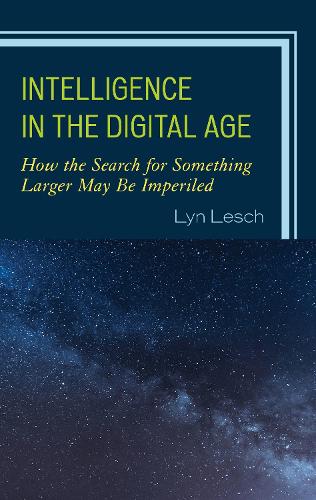
Intelligence in the Digital Age: How the Search for Something Larger May Be Imperiled
(Paperback)
Publishing Details
Intelligence in the Digital Age: How the Search for Something Larger May Be Imperiled
By (Author) Lyn Lesch
Bloomsbury Publishing PLC
Rowman & Littlefield Publishers
8th November 2019
United States
Classifications
Professional and Scholarly
Non Fiction
Educational psychology
Education / Educational sciences / Pedagogy
370.15
Physical Properties
Paperback
132
Width 154mm, Height 223mm, Spine 10mm
209g
Description
Intelligence in the Digital Age examines how our current Internet age and peoples use of digital technologies may be affecting their mental capacities and emotive lives in ways in which it will become increasingly difficult for those people to explore a larger, more expansive consciousness.
After beginning with an examination of how peoples attention spans, working memories, and capacity for deep thought and reading are being imperiled by their addictive use of smart phones and PCs, the discussion continues with how this may be occurring at a deep level at which the brain creates short and long-term memories, pays attention, and thinks creatively.
The book then explores how these negative effects may impede the search to explore the limits of ones thinking mind and memories in pursuit of a larger intelligence. People may have fewer opportunities to be successful in this pursuit simply because they will have lost access to important personal dynamics due to the effects of the digital world on their minds, brains, and inner lives.
Reviews
In Intelligence in the Digital Age, Lyn Lesch offers a thoughtful, and thought-provoking, meditation on how our digital devices are affecting our memory, attention, creativity, and freedom. -- Susan Matt, Presidential Distinguished Professor of History, Weber State University and co-author of the book Bored, Lonely, Angry, and Stupid: Changing Feelings about Technology, from the Telegraph to Twitter
Intelligence in the Digital Age describes the profound changes that digital technologies are having on our basic capacities for attention, intelligence, creativity, and human relationship. Lyn Lesch reviews a wide range of research that documents the deleterious effects of the constant flow of fragmented information. This is a vitally important book for educators, psychologists, parents, and every informed citizen. -- David Edmund Moody, former director of the Oak Grove School and author of the book An Uncommon Collaboration: David Bohm and J. Krishnamurti
Author Bio
After founding and directing his own democratically run school for children ages six to fourteen for twelve years, one that received widespread attention in the Chicago area as a unique approach to education, Lyn Lesch has written four books on education reform, all of them emphasizing the importance of what occurs inside a young person while they learn. He has a lifelong interest in pursuing a larger consciousness.
